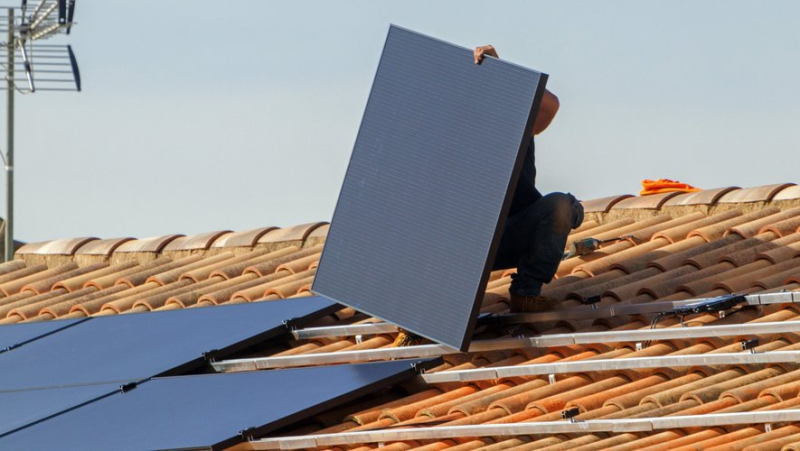Collect rainwater, install photovoltaic panels… How to move towards autonomy for your home

Installer des panneaux solaires sur son toit peut être un bon investissement, au-delà de l'aspect écologique. MAXPPP – Jean-Marc Lallemand
Il est difficile, encore aujourd’hui, de ne plus dépendre des réseaux. Mais on peut largement réduire ses consommations.
It is difficult, if not impossible, to make a home completely autonomous, in particular because legislation, since 2008, has prohibited the use of water falling from the sky for human consumption – which activists legally contest, especially since filtration techniques make it possible to make it potable.
Collect rainwater
There are, however, possibilities to reduce water consumption, for example by opting for dry toilets or by installing rainwater collectors (from 200 to 1,000 liters, prices vary widely ) which allow, at a minimum, to water your garden and vegetable patch or to wash your car, or even with more complex and buried systems, to power toilets and washing machines. It’is necessarily more expensive (sometimes beyond 5,000 €) but at a time when the resource is becoming scarce, it’s virtuous.
Before getting started, however, you must "examine the rainfall data of your municipality and the catchment area to calculate the collectable volume", advises the Eau Douce collective. In our region, a roof of 100 m² can recover approximately 70 m3 of rainwater per year for an average individual need – including drinking water – of 54 m3. Not nothing, even if these calculations have unfortunately been less relevant in certain places for two years, notably in the Pyrénées-Orientales department which suffers from a precipitation deficit.
Electric self-consumption
In the sky, however, there is another wealth that can help make your home less greedy: the sun. "The Positive Energy Region strategy led by the Occitanie Region aims to halve energy consumption per inhabitant and cover 100% of the territory's energy needs with local renewable energies at the same time. ;horizon 2050. By renovating their property, everyone can be an actor", often says the president of the Region Carole Delga.
This is all the more true since, thanks to the drop in production costs of electricity from renewable and photovoltaic sources in particular, self-consumption has become economically attractive. More than resale on the network "at a price which tends to decrease each year, when the electricity bill increases", adds Lukas Maurin of the local energy and climate agency (Alec) of Montpellier Métropole.
It is therefore advisable to opt for the principle of self-consumption, with resale of the surplus, because it is difficult to consume 100% of what we produce, even by installing storage batteries (from ;rsquo;a cost of approximately 3,000 €) "rarely profitable". "Before embarking on such a project, you must carefully study your consumption profile", warns Lukas Maurin, who points out the obvious: "It’s during the day and on sunny days that photovoltaics will produce the most electricity, but these are not necessarily the periods when electricity needs are greatest& ;quot;. However, we can modify these habits, in particular by programming certain appliances (dishwasher, washing machine) during the day.
Making the right choices
Above all, you must be careful not to oversize your installation. Generally, 3 kWp is enough for a household ", assures Alec’s expert. This represents, according to Engie, approximately 13 m² of panels on the roof for an average cost of 9,000 to 13,000 € depending on the choices made. We can hope to produce between 2,700 and 4,200 kWh/year, or approximately 40 to 60% of needs. And just as much saved on the electricity bill. The promised profitability oscillates "from 10 to 15 years" for a lifespan of solar panels which has increased in recent years, up to at 30 years old..
Between an eco-friendly gesture and long-term savings, the operation can be tempting. But, recalls Lukas Maurin, producing your energy, "this is the last step, in individual housing as well as in co-ownership. The priority remains above all to reduce housing consumption.
I subscribe to read more




